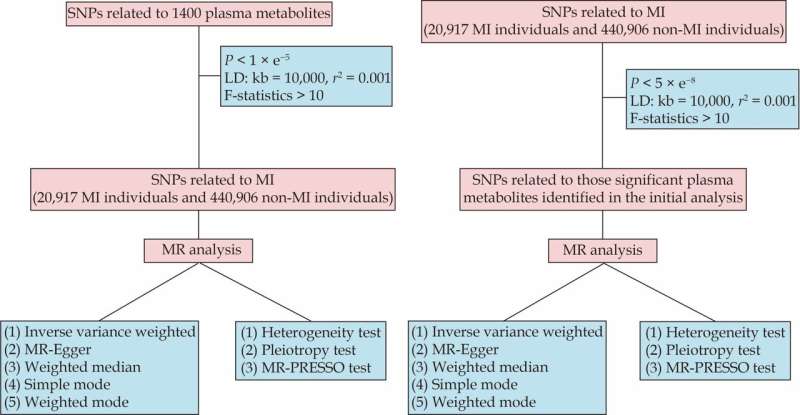This article has been reviewed according to Science X's editorial process and policies. Editors have highlighted the following attributes while ensuring the content's credibility:
fact-checked
proofread
Plasma metabolite biomarker could help identify who is at risk of a heart attack

Myocardial infarction, more commonly known as a heart attack, is a leading cause of death worldwide. Biomarkers called plasma metabolites may play a key role in the physiological pathways involved in myocardial infarctions. Recently published research used a methodological approach called bidirectional Mendelian randomization to understand more about these biomarkers and what they can tell doctors about heart attack risk.
The research was published in the Journal of Geriatric Cardiology on February 28.
"Bidirectional Mendelian randomization studies represent a robust methodological approach, with numerous advantages not commonly present in traditional research methodologies. These include mitigating the impact of confounding factors on conclusions and exploring reverse causation, thereby providing a more reliable foundation for casual inferences," said Qiang Wu from Senior Department of Cardiology, the Sixth Medical Center, Chinese PLA General Hospital, Beijing, China.
"This study employed a bidirectional Mendelian randomization approach to investigate the relationship between plasma metabolites and myocardial infarction, offering new insights into the early diagnosis and potential treatment of myocardial infarction."
By using data sets from large-scale genome-wide association studies, researchers were able to cast a wide net to try and understand more about the role plasma metabolites play in myocardial infarction. The data source included 461,823 individuals of European descent.
Of those, 20,917 individuals had myocardial infarction and 440,906 individuals did not. A total of 24,172,914 single nucleotide polymorphisms were identified in that data set to be associated with myocardial infarction. Bidirectional Mendelian randomization narrows down this large amount of data and determines the relationship between plasma metabolites and myocardial infarction.
This analysis uncovered 198 unique plasma metabolites that were identified to have a significant association with myocardial infarction, of which 14 plasma metabolites had a direct relationship with myocardial infarction risk.
"We identified 14 plasma metabolites associated with myocardial infarction, of which 8 plasma metabolites were linked to a decreased risk and 6 plasma metabolites were linked to an increased risk, underscoring the complicated nature of metabolic pathways influencing heart attack risk," said Dong-Hua Li from Department of Cardiovascular Medicine, Minzu Hospital of Guangxi Zhuang Autonomous Region, Guangxi, China.
"The robustness of our findings was strengthened by the application of bidirectional Mendelian randomization, enabling a thorough exploration of causality."
Of the 14 plasma metabolite biomarkers identified in this study, 13 plasma metabolite biomarkers had never been identified as potential biomarkers associated with myocardial infarction before. These biomarkers offer a new option for developing diagnostic tests, routine screenings, and treatments for heart attack.
Looking to next steps, researchers are hoping to learn more about the mechanisms of these plasma metabolites and how they are related to myocardial infarction. For example, there were 8 plasma metabolites that were associated with a decreased risk of myocardial infarction and researchers speculate that anti-inflammatory properties associated with metabolites are at play, reducing oxidative stress in the body. However, additional research is needed to confirm this hypothesis.
"Timely detection using metabolic signatures could usher in a new era of preventive cardiology, where interventions are tailored to an individual's metabolic profile. Furthermore, understanding the metabolic underpinnings of myocardial infarction will contribute to the development of point-of-care diagnostic tools, providing rapid and accessible assessments.
"Thus, the findings of the study can revolutionize clinical practice by enabling early and precise diagnoses, ultimately causing more effective and tailored treatment strategies," said Qiang SU from Department of Cardiology, Jiangbin Hospital of Guangxi Zhuang Autonomous Region, Guangxi, China.
More information: Dong-Hua LI et al, Plasma metabolites and risk of myocardial infarction: a bidirectional Mendelian randomization study, Journal of Geriatric Cardiology (2024). DOI: 10.26599/1671-5411.2024.02.002





















